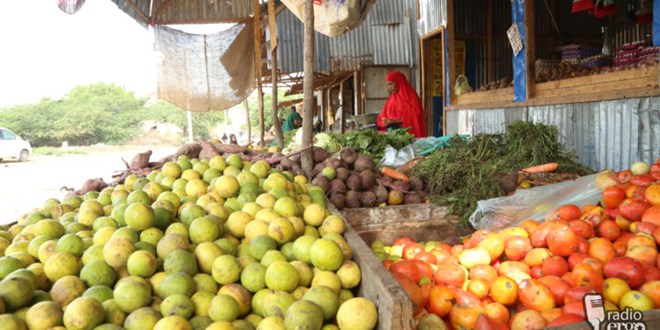
Tuesday July 30, 2024

A Somali woman sell fresh produce displayed on a table/File photo/Ergo
Around 100 women making a living selling fresh fruit and vegetables in Luq have been put out of business since the local farms supplying them were hit by last year’s river flooding in this district of southern Somalia’s Gedo region.
With no other source of livelihood, household earners like Madino Mohamed Barkan, 66, have been forced into a precarious living.
advertisements
On 10 June, Madino shut down her stall and moved with her husband and their 10 children to the IDP camps. She had not been able to pay her $50 monthly house rent for three months.Once a proud business woman, she is now begging to make ends meet for her large family, while her elderly husband stays at home as he can’t work.
“Some people have income while others don’t. Some people give us rice, others give us flour. If we get to cook one day we are uncertain about the next day,” she said.
Madino had been earning $5-10 a day from her stall that covered their needs. However, four of her children had to drop out of school in April when the supply of fresh produce ran out.
“At the end of the month I paid 100,000 shilling ($4.5) for each child. Now we don’t get any income. My children were kicked out of school and they stay at home. My husband is elderly; he can’t get up to go to work. I was the provider from my family and now I don’t know where to go to,” she said.
Madino sold bananas, tomatoes, onions, pepper, potatoes and other vegetables. Some fresh produce reaches the markets in Luq from Ethiopia, although it is in short supply and expensive. For instance, a kilogram of tomatoes that normally sold for $1 has reached a record high of $3.
Madino and her family were formerly pastoralists, who were displaced after prolonged drought killed off their herd of 172 goats. They spent four years living in IDP camps in Gedo. In 2019, she started up her fruit and vegetable business that enabled them to attain a decent standard of living.
Now, however, they have had to return to the dreaded life in the camps again.
Shamso Ali Nunow, 32, has also been affected by the shortage of produce in Luq. This mother of six has been getting some food from her relatives but is now having to take loans.
“I was managing my bills from my business stall. My children would get three meals a day but since I lost my business our situation is no longer normal,” she said.
She hasn’t had any business since May. The farmers supplying her have not been able to plant anything this year.
With 15 years in this business, she said it is the first time she has had to close. She understands that the farmers are also demoralised, having seen river floods wash away their crops and investments.
She has accrued loans to feed her family at an alarming rate.
“I have taken $350 in loans, and since my debt is rising, it is hard to get more loans. I took rice and spaghetti on loan. There is nowhere else I can get income,” she said.
Bayniyo, 36, another mother living in Luq, used to buy lemons and hawk them at bus stops. She also sold livestock fodder, but last November’s floods were very destructive.
“I have been unemployed for several months. There’s nowhere I can start business because the lemons and livestock fodder have been destroyed. There have been various challenges. We are faced with severe food shortage. I don’t have money to pay for my children’s school fees,” she said.
Two of her children were in lower and middle primary schools but had to drop out. Bayniyo has taken food worth $100 on credit from local stores and doesn’t know how she will be able to repay her growing debt.